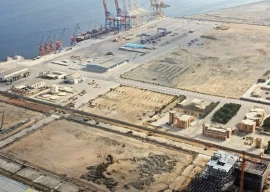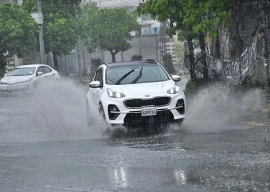
On Monday, President Vladimir Putin recognised the independence of the two separatist regions in eastern Ukraine, as the Donetsk People’s Republic and the Lugansk People’s Republic. Considering this a first step in the invasion of Ukraine, Britain has already announced hard sanctions. And on Thursday, Russia started attacks, as Putin announced, “I have made the decision of a military operation.” The geopolitics of this event is alarming.
In 1954, one year before entering the Vietnam War, President Eisenhower of the US made a speech suggesting that the fall of French Indochina to the communists could create a ‘domino effect’ in Southeast Asia. This so-called ‘domino theory’ remained their guideline during the war, and when they lost in Vietnam it actually happened that the whole of French Indochina — comprising Cambodia, Laos and Vietnam — that the US wanted to salvage as the victors of WWII went out of their hands, becoming pro-communist.
The same ‘domino effect’ was observed at the end of the Russo-Afghan War, when 14 USSR colonies in Central Asia and Eastern Europe broke away from it, tottering down the world largest empire. The question is: has there been a possible domino effect around the end of the US-Afghan War, and how far reaching can it be?
Certainly, the world has changed over the last three decades. The seismic range of major events may not be restricted to regional spheres, rather their effects may be global now, just like the Arab Spring that was sparked in Tunisia by a street hawker and within a year or so its fire had engulfed the whole Middle East and North African region, hitting Syria at the end. And just like when Iran decided to push ISIS out of Iraq, and Russia and Turkey decided that they would stand with Bashar al Assad to defeat NATO interests in the region, the US and NATO had to face embarrassing retreat from Syria, Iraq and Libya and even leave the scene in Yemen.
So this happens. In the intertwined geopolitical landscape of today, things have become so close that anything can fall like dominos upon so many others. The question thus arises: is the Afghan victory against the superpower US and its NATO allies going to be a potential domino falling on the world chessboard, and if so towards which side will it fall?
The first clue had already come in the case of Ukraine. When Biden announced US withdrawal from Afghanistan in April 2020, Russia started building its troops along the Ukrainian border in the same month. In July, Putin published an essay wherein he re-affirmed his view that Russians and Ukrainians were ‘one people’; and in December he presented his security demands including that NATO ceases all military activity in eastern Europe and Ukraine and that the alliance never accept Ukraine or other former Soviet nations as members.
The crisis had started with the 2014 Euromaidan movement, the annexation of Crimea and the ensuing Donbas War, but Russia escalated the situation to a war-level after over a seven-year wait, only after the Afghan victory. Another event that has happened only after the Afghan victory is the settlement of the over three-decade old Nagorno-Karabakh Conflict. Low intensity warfare had been ongoing between Armenia and Azerbaijan, yet it seemed to be a war nobody wanted to resolve. Russia, who posed as a neutral mediator, was often accused to be ‘playing on both sides’ and ‘ultimately more on the Armenian side’; Turkey, who had its own longtime grudges with Armenia, was openly with Azerbaijan; Pakistan too had a major role, as it is the only country that has yet not recognised Armenian statehood, being an ally of Turkey.
On September 27, just weeks after the US withdrawal from Afghanistan, Azerbaijan launched an offensive to reclaim Nagorno-Karabakh. It was alleged that Turkey provided military support to Azerbaijan, and that fighters from Pakistan had played a role. Though there is no verification of these allegations, Pakistan and Turkey enjoy deep ties with Azerbaijan. The decades-old issue was resolved within a month’s offensive and Armenia retreated from Azerbaijanian territories. It is understandable why Russia did not help Armenia as it had before. At a time when Russia is pronouncedly against the joining of its peripheral state in the NATO or EU, it would not want a strong Armenia which aspires to do so too.
Coming back to the Ukraine crisis, in addition to the over 100,000 troops near Ukraine’s eastern and southern borders, Moscow has amassed up to 30,000 Russian troops in Belarus too, on the pretext of a joint military exercise. Moscow could use Belarus as a launching post to attack Ukraine’s capital Kyiv, in case of war. But is Moscow’s aggressive stance for no reason?
The truth is that the US and allies moved the East European, post-Soviet states of Romania, Latvia, Estonia, Lithuania, Bulgaria into NATO in 2004, after which they have been hell bent on taking in Ukraine, and Belarus too. Moreover, NATO has placed ballistic missile systems in Poland and the Czech Republic, and Russia believes that this is merely a prelude of a larger programme to saturate Central and Eastern Europe. While conversely, the US believes Moscow could think of reestablishing its hegemony over Eastern and Central Europe, and even in the Central Asian States.
As of now NATO’s command systems are present in Romania, Latvia, Estonia and Lithuania. And Russia, as mentioned, is present in Ukraine and Belarus. Some 3,000 new US soldiers have been received in Poland and Romania; 1,000 more French soldiers are expected in Romania; Germany is reinforcing its battle group already in Lithuania; the UK is in Estonia; Canada will reinforce in Latvia; and German and Spanish jets are hovering over Bulgarian airspace. Meaning that in case of a war, all these states, in fact the whole Eastern Europe, will be in the line of fire. So while the dominos of devastating war would be falling on the poor Eastern European states, big powers like Britain, France and Germany would be playing with sanctions and proxies — exactly the fate expected for all these East European states when they were joining NATO in 2004.
Meanwhile, President Biden has been ‘convinced’ from the beginning that Russia will invade Ukraine. Always happy to ignite wars in other people’s lands, the US would probably be the only one rejoicing as Eurasia braces itself for another bloodshed.
Published in The Express Tribune, February 25th, 2022.
Like Opinion & Editorial on Facebook, follow @ETOpEd on Twitter to receive all updates on all our daily pieces.















COMMENTS
Comments are moderated and generally will be posted if they are on-topic and not abusive.
For more information, please see our Comments FAQ